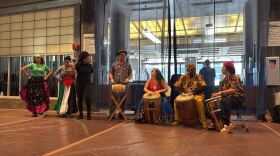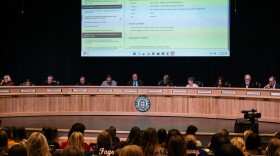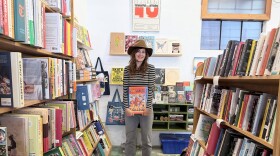MICHEL MARTIN, host:
I'm Michel Martin and this is TELL ME MORE from NPR News.
Coming up, it's never been easy taking care of elderly relatives, but now the recession is making it that much harder. We'll talk about that in our Behind Closed Doors conversation in just a few minutes.
But first, we want to talk about breast cancer. Nearly 180,000 women are diagnosed with breast cancer every year in the U.S. But so much about the disease remains unknown, like, why are black women less likely to get breast cancer than white women, but more likely to die from it? So now a group of scientists are trying to answer some of these critical questions by focusing on a key relationship - sisterhood.
It's called The Sister Study. The National Institute of Environmental Health Studies has sought out 50,000 women whose sisters have been diagnosed with breast cancer, and it will monitor their lives and their health for the next decade. It's the largest long-term study of its kind. The goal is to determine the role that genes and environment play in the incidence of breast cancer.
And unlike many similar research projects, The Sister Study has focused on including a substantial number of women of color. Here to tell us more about The Sister Study is its principal investigator, Dale Sandler. She is the chief of the epidemiological branch at the National Institute of Environmental Health Sciences.
Also with us is Lynya Floyd. She is the senior editor of health and relationships for Essence magazine. Essence has been covering the study and has also encouraged women of color to participate. I welcome you both. Thank you so much for speaking with us.
Dr. DALE SANDLER (National Institute of Environmental Health Science): Thanks for having me.
Ms. LYNYA FLOYD (Essence Magazine): Thanks for having me.
MARTIN: Dale, I want to start with you. How did you get the idea for The Sister Study?
Dr. SANDLER: Well, there was a lot of interest among women who had breast cancer about the possible role of the environment, and we, in fact, were challenged to think about an innovative way to address this, because Congress had gotten the message. So we decided that this would be an innovative way to address the role of the environment in breast cancer.
MARTIN: What do you hope to uncover with this research that previous studies have not told us?
Dr. SANDLER: Well, I think that one of the things that makes our study unique is that we are focused on the environment, as well as on genes, and we also are including a diverse population of women. And so we hope that we will have the chance to identify the interaction between women's environmental exposures and their genetic makeup as it relates to breast cancer risk.
MARTIN: Lynya, I want to bring you, and Dale, you may want to answer this next question, too. Lynya, as I mentioned in my introduction, African-American women are disproportionately dying from breast cancer. They have not been disproportionately studied, however. Why do you think that is? And are researchers just having not been as interested? Or are women of color more reluctant to be part of studies like this?
Ms. FLOYD: Well, I think it's a combination of factors. I do want to applaud The Sister Studies for making such a great effort to enroll so many minorities and African-American women in particular. I think that that's fantastic. But, yes, I will say that sometimes there is a hesitation on the part of the African-American community to participate in research - to participate in clinical trials.
There's a little bit of hesitation just because of the history that has gone on in terms of medical trials in this country and, also, just a sense, you know, maybe you don't want, you know, your personal business out there. So, there are a couple of barriers, but it's so critical for African-American women, particularly to participate in a study like this, The Sister Study, which is fairly, you know, not as invasive as one might think.
It's kind of minimally invasive. And it also has the potential to uncover so much critical information about why black women are disproportionately affected. I mean, black women under 50 are twice as likely as white women of any age to get an aggressive form of breast cancer, were disproportionately affected by those. We need to get at some of these answers as to why this is happening to us. And The Sister Study is an empowering way to do that.
MARTIN: Dale, what have you learned over the course of the time that you've been doing this work? Is it harder to recruit an ethnically diverse group of people to participate in studies? Is it because people of color are not as connected to research institutions? Are they more reluctant in your experience?
Dr. SANDLER: I think it's a combination of factors, as already been said. And it is definitely harder to reach certain populations of women. When we announced the study officially, nationally, in October of 2004, we had a press conference, and we had an overwhelming response. In fact, so many women joined the study. We had a hard time getting to them in a reasonable amount of time to get them through the study.
And almost all of those women were white. Those were women who are out there searching the Internet looking for information on breast cancer. And then over the next four years we've really had to work to get ourselves into the African-American community, to get recognized spokespeople, so that we would be acceptable in the community. And we had to work harder to express our message.
MARTIN: Lynya, Essence covers health issues very closely, and I can understand why, of course, you'd be interested both in covering the study and getting people to participate. And Essence has a very close relationship with its readers, so when you talk to folks either online or however you reach out to them, what do they say? Have they told you why they don't want to get involved? And are they excited about this particular study now?
Ms. FLOYD: Well, one story that I want to relay is last year, last October, when we covered breast cancer, I had an opportunity to interview Robin Roberts, whose sisters participate in a Sister Study. And one of her sisters shared with me that last year she didn't even want to get a mammogram. So there's a - she has a fibrocystic breast, and she had had a biopsy the year prior to that.
And it left her with a scar, and she was just very hesitant to go through the entire process again. So when you're talking about breast cancer in general, even when there is this looming threat, even with this celebrity sister, she was reluctant to even go get a mammogram. So now you're talking about taking it another step further and being an active participant in kind of trying to uncover some of the reasons why we're disproportionately affected.
So, you know, I'd have to say that fear comes into play and can be a discouraging factor. At the same time, I do want to express how many things black women can do to fight breast cancer. So it doesn't have to be this thing that happens to you and disempowers you. There are so many things that you can do to prevent it, things that you can do once you've been diagnosed. And, obviously, as we're talking about today, things that you can do if somebody - if your sister has been diagnosed and you haven't.
MARTIN: Dale, how much longer is this study going to be open for enrollment and it was interesting to hear you say that, in fact, initially, there was such a response, but it was skewed in a way, sort of, one part of the population. So how is that recruitment effort going? And how much longer will the study be going on?
Dr. SANDLER: Okay. Well, we've actually recruited, or we have enrolled all the way through this study, 47,000 women. So we need 3,000 more women and our focus is on making sure that all of those 3,000 women are minority women. And we have a number of last-minute, you know, initiatives that are really focused in the African-American community, and we expect to do those.
I think one of the things that we've learned from women who do participate and - is that joining The Sister Study does empower women. It gives them - it makes them proud that they're doing something to help their sister, or they feel they can help their sister. Although it's not a direct help for their sister, but they're doing something to honor their sister. And they're taking charge. And they are contributing information that can help other women.
MARTIN: And Lynya, finally, do you think that - you mentioned that the history there is a history, of course, of African-Americans being abused by medical researchers for, which we don't have time to go into. But do you envision a time when that stigma will no longer be there, when we won't have to have these kinds of conversations? When…
Ms. FLOYD: Definitely, and I think that that involves education, and we've done a story about this in the past - what is actually involved in a clinical trial. A lot of people don't realize how much power they have when they're participating in a clinical trial.
Whether it's, you know, if you don't like the way that it's going, whether you know, to drop out or to, you know, complain about what's going on, but how empowering it can also be to be in a clinical trial because of the access to care and possibly new medications that you have.
So I definitely don't think that we'll forever be living in the shadow of, you know, horrible incidents like Tuskegee.
MARTIN: Lynya Floyd is the senior editor of health and relationships for Essence magazine. She was kind enough to join us from our studios in New York. We were also joined by Dale Sandler. She is the head of chronic epidemiology and a principal investigator of the Sister Study, and she joined us from the University of North Carolina. I thank you both so much for speaking with us, and good luck with your work.
Ms. FLOYD: Thank you.
Dr. SANDLER: Thanks. Transcript provided by NPR, Copyright NPR.





